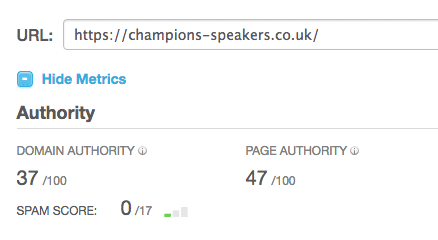Have you ever been questioned on how you can drive more organic traffic to your website? Or been asked to provide KPIs for what you can achieve with SEO efforts in the next 6-12months?
Haven’t we all.
But before we begin to answer questions of that sort, it is important to understand, as well as explain to management, what SEO actually means and how it works.
Rest-assured what you are about to read is not something I’ve based on reading online only. It is based on actual experiences throughout my SEO career (in-house and agency side), through tested methods. Let’s begin with what a small website is.
What is a Small website?
A small website could consist of 10 or even 1000 pages. The best way to define whether your website is small or not, is through conducting market research.
Find direct competitors of your website in Google by searching for similar products or services you offer and collate the domains in a document. Once gathered, you need to understand how many pages they have individually. E.g. brand A – 1.5k HTML pages, brand B 400 HTML pages. Upon finishing this task, it will provide clarity on where you stand against your direct competitors and whether your site is small, medium or large.
A useful tool that I use on a regular basis to crawl websites and uncover all of the existing URLs, is Screaming Frog. This tool not only lets you figure out how many pages a website has, but reveals the title and meta tags used, headings and many more technical areas for analysis.
N.B. The first 500 URLs are crawled free for any domain. To crawl more than 500 pages URLs there is a paid version, which in my opinion is a small investment that is really insightful when conducting audits and competitor research.
What you should review before you tackle SEO/Content Strategies
To ensure a website is in the best condition to start ranking or growing organically, there are a few things you should consider, prior to focusing on content.
- Sitemap – is this set up correctly and does it display relevant information? i.e. priority, last modification date etc.
- txt – is there a robot.txt file and is it blocking any URLs that are important? Does it mention the sitemap?
- Meta Tags – are the meta tags (title and meta description) optimized, letting readers know what the page consists of (seen on SERPs)
- Load time for website – How long does the site take to load? Slow load times equate to bad user experience, which Google is not a fan of.
The Essential SEO checklist is a useful tool to showcase what elements should be considered when launching a new website.
So all these factors have been considered in the checklist and your biggest challenge now is the market that you are in? We know it’s not easy beating big brands that have a lot of resources, or that’s what we are supposed to believe. However, there is also a simple strategy you can deploy to gain your share of the marketplace. After all, big fish move slow… less agile, if you know what I mean.
Conquering Super-brands on Google
Big brands have two things in common that make them stand out. The first is great credibility which churns out natural backlinks and mentions in volumes (this creates the challenge of then managing a large number of backlinks to ensure that they are adhering to Google’s guideline). The second being branded search, which helps drive a lot of traffic to their website.
The second is just as important as it shows to Google that the brand has significant popularity and, in my opinion, gives the domain further credibility when content is published (popularity relates with trust, trust reflects credibility).
How can you beat big powerhouses in SEO?
Big brands don’t always have time. They are slow to change and have processes in place making them very slow movers. Furthermore, they already have a big database of prospects at hand, hence investing time in converting more fruitful (ROI) than acquiring new customers. Touching on the 80/20 rule where 20% of customers bring in 80% of the revenue.
And as for a new or small website, the aim is to gain awareness and traffic over conversion. This comes further down the Race Model. So, we can tackle them by picking up all the niche areas they miss, becoming an expert in the field.
How will you start ranking though? One of the best ways to begin ranking with a small website is to target longtail keywords. Since searchers have become more used to search engines and how they work, people have begun searching for more specific queries. An example of this is ‘light running shoes for summer’. Previously, this query would have just been ‘running shoes’. By targeting specific longtail search queries, smaller websites are able to possess a better chance at ranking in the SERPs for really specific and niche queries.
How to find Long-tail keywords
There is no one way to acquire these keywords, but what I would suggest is sitting down with product and service managers to go over possible questions that your potential visitors may have. Another key area when conducting this meeting is to focus on the user intent, as it will drive quality traffic to the website. Once this has been done, begin mapping out the long-tail keywords or phrases that your prospects may ask in Google. When you consider the phrases, you may want to have your personas on hand to see if they are a good fit for them.
Not created a persona before? Learn how to create personas.
Have you conducted Keyword research for your site?
Another pain point for new websites and small website owners is to have a previously built website without keyword research. Hence all the copy in the website is based on what a copywriter believed the website should show, and whilst this is good for the visitor, it may not be as easy for Google to understand what you are selling. Optimising pages for relevant keywords is important. How we go about this will be covered next.
Tip: It is best to not optimize a page for several keywords that have no topical relevance (i.e. homepage)
Each page holds its own right to showcase authority in a certain area. I.e. example.com/winter-running-shoes would talk about what running shoes and how they are made for winter. It wouldn’t necessarily need to talk about winter hats. Keeping a topical focus increases the page’s authority in that specific area, making the page very insightful for users (which Google loves). To rank for ‘winter running shoes’, just writing with a topical focus is not enough, you would need sufficient on-page optimization and relevant backlinks (which we will cover further in the post).
Now to the more nitty-gritty. When conducting keyword research, aim to focus 1 or 2 core keywords for each page you believe would bring value to the page. Remembering to choose only the most relevant keywords and not random/unrelated keywords. Once you have found the core keywords for each page, you should get supporting, related keywords for each page that makes the page topical.
For example, the page below is optimized for Family Law Solicitors and has supporting keywords such as family law, family law firm, child care, legal services.
Tip: suggest keywords to copywriters, don’t enforce them as it will impact the quality of the work. Also, as a small/new website look at less competitive keywords/terms to rank for (SEMrush provides the keyword difficulty for keywords when considering ranking in Google)
There are many tools in the market that can be used to find keywords, but my personal preference is SEMrush (a paid option). Keyword Planner is also another place you can find keyword ideas for free, but take the figures with a pinch of salt, as they are not 100% accurate.
All your valued pages are optimized, what’s next?
Creating Content because Content is King?
The phrase ‘Content is King’ may sound gimmicky, but there is a reason behind i. Content plays a vital role in getting traffic to a website and having mixed content (i.e. videos, copy, images) makes a page more engaging, which is favoured by Google. These pages cater to a wider audience and enrich the overall user experience.
But before we go into the creation, we need to first highlight that many small website owners do not create personas. Knowing your personas helps guide the content you look to create, to fulfil its true purpose… informing/converting the end user. Not having personas is like shooting blindly and hoping for the best. Below, I have listed a few steps you should consider prior conducting a content plan.
- Set goal(s) of what you would like to achieve
- Create personas- find out more here {link to persona page – smart insight}
- Add ideas of that target to set personas you have created – best to sit with colleagues and do as a group rather than individually
- Confirm a content schedule based on priority, seasonality, upcoming events and any other additional factors
- Place in a content calendar, which highlights month, week, content type, content title, target persona, keywords, supporting departments (i.e. design for visuals), deadline and any other areas you feel suffice to keep track of the content
- Publish the content and utilise social, email marketing and other channels to gain additional exposure
- Outreach to relevant bloggers (that have audiences that would be interested in your content – with the aim of gaining backlinks)
- Track how well content performs and adjust the content if bounce rates are high.
Tip: Content takes time to rank, between 3-12 months. This is because as time goes on, the content gains credibility. You may have experienced this when you’ve searched for something and the results were from 2016 or 2013. Search ‘When should I eat fruit’ in Google and see what you find.
Here are a few things that should be considered when planning for content:
- Purpose – are you trying to sell, inform and has it been achieved?
- Is the content easily digestible or overkill?
- Have all the questions been answered?
- Are the title and meta description tags accurate, do they incorporate core keyword as well as standout (to increase click-through rate on SERPs)
This should give you a good standing and assist in gaining good traction in the search engines.
If Content is King, what is Queen? Backlinks
Google gives every single domain an authority score out of 100, yet this isn’t revealed to the public. MOZ has created a tool which gives us an indication of what domain authority a site may be by inputting in MOZ’s tool and getting results. But why is domain authority being discussed in the backlinks section? Because backlinks are one of the main factors that pass credibility to another site. And the most common way to acquire backlinks is through creating compelling content that people want to talk about and refer to. This is why it goes hand-in-hand with content.
Definition – Backlinks are links coming into a website from another website.
The key to acquiring backlinks is being proactive and finding niche topics to cover. Covering a niche area will help in two ways. Firstly, you’ll gain credibility in a given topic (depending on how informative the content is) and secondly, it will attract experts who would read and refer your content as a useful source in their blog posts/articles. If you think this is done as a small website owner, then you are mistaken. Do not anticipate experts to find your content, you will have to go to market with your brilliant content. Showcase your content on social channels and outreach to experts who may find your content useful. Getting the word out is as crucial as writing a detailed piece of content in most respects.
There are also other methods of gaining backlinks, such as guest posting on third party sites (directing them to your resourceful content) and listing your business in local business directories. However, you must avoid paying for backlinks. Anyone paying for backlinks runs the risk of being penalized by Google.
What is the difference between Domain authority and page authority?
Domain authority is a measure of a domain’s credibility out of 100. Page authority is a measure of the page’s authority out of 100. Domain authority is the overall score of the domain, whilst page authority is calculated individually for each page. Use the MOZ tool to understand the difference practically.
Which is more important?
Domain authority summarises the whole domain’s value (all URLs), so this factor is important when considering whether your hard work for 6 or 12 months has led to increased credibility (KPIs). Whilst page authority is important when you want a page (URL) to rank for a certain keyword, arguably domain authority should take lead. A way to build page authority is by getting backlinks directly to the specific page. Another way to do this is to utilise links from already powerful pages within your website to link to the page you want to focus on (also known as internal linking for SEO).
Why most small businesses struggle to rank is because they find it hard to acquire domain authority. But by creating great content regularly and outreaching it regularly, you will build great awareness in rankings and relationships with experts (leading to brand credibility too).
To summarise, new and small website owners should consider the market. Build personas to create compelling content plans which incorporate core and topical keywords. Upon completing such content, you should incorporate into a multichannel strategy to gain additional exposure (don’t just rely on search channel to boost your rankings, help the page gain traction and credibility). Additionally, outreach the content to websites that have target audience groups which would find the content useful.
When will I know if it’s worked!
Content can take up to twelve months depending on the competitiveness of the keywords you are targeting. But rest assured, as you publish rich/niche content that is useful to your target audience and acquire backlinks, your credibility will grow.
Got a question? Just tweet me @hiten_patel_







